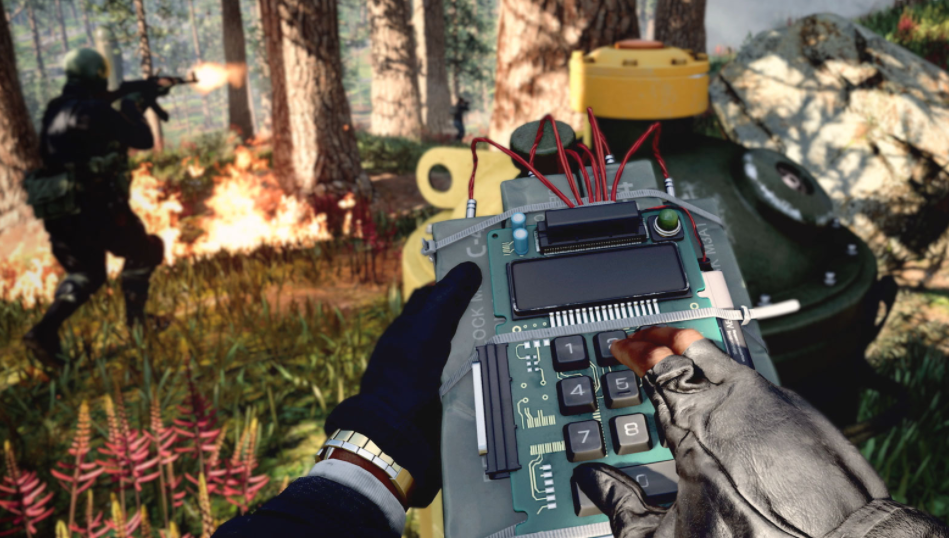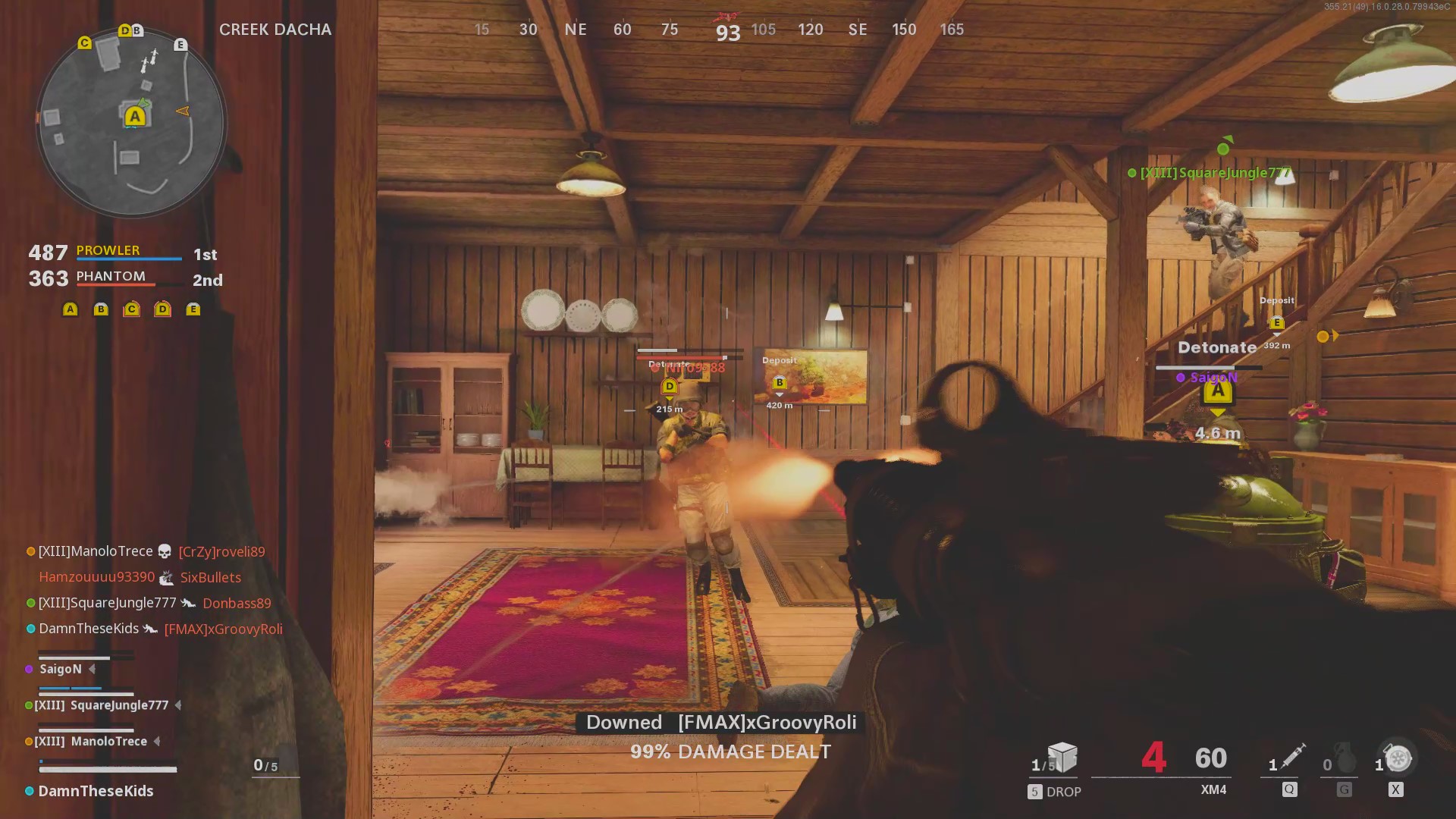Cold War's 40-player Dirty Bomb mode is a complete mess, but also kind of amazing
Deposit, die, repeat.

Nestled among the multiplayer options in Call of Duty: Black Ops - Cold War is the tastefully named Dirty Bomb mode. Although Cold War and Warzone will be fully integrated on December 10, Dirty Bomb is some kind of vanguard for the series' future of cross-pollination between annual and ongoing titles. Which is to say that it's a mix of objective-based multiplayer with Warzone-style mechanics (it takes a lot from Plunder in particular), and a confusing mess with flashes of brilliance.
Here's what happens: up to 40 players, in fireteams of 4, parachute into a medium-sized open map. The map contains five dirty bombs labelled A-E, which need to be filled with uranium before being detonated, and every team can see the progress being made on each bomb. Uranium is found in chests, which can also contain gear and scorestreaks, and players drop any they're carrying when killed.
Dirty Bomb is at its best when the objectives pull together two teams and, while they're fighting, a third comes out of nowhere, artillery hits, bodies fly, and suddenly it's anyone's game.
The bits that are like Warzone: parachuting in; squad firefights; last stand and revivals; the chests (kinda); traversing scrubland between small built-up areas; the vehicles. The bits that feel like traditional COD MP: the objective constantly bringing teams together; frequent respawns; collecting uranium like dogtags in Kill Confirmed; quick switches in focus from one part of the map to another. Does it all hold together? Yeah maybe not really it depends.
The experience varies wildly depending on if you're playing with mates or randoms, no surprise, but either way it puts you straight into the action. Your squad agrees which objective to hit, parachutes in, raids nearby buildings and starts to get in fights. So far so Warzone, which I confess I'm using as a bit of shorthand because the mode Dirty Bomb most resembles a mini-version of is that game's Plunder sub-type, and particularly in the early stages.
Dirty Bomb is often absolute chaos, and that in itself is not a criticism. I enjoy COD multiplayer a lot but, certainly compared to something like Counter-Strike, it is more random and messy. You could say that's the point. Dirty Bomb is at its best when the objectives pull together two teams and, while they're fighting, a third comes out of nowhere, artillery hits, bodies fly, and suddenly it's anyone's game.

I don't have a problem when I get shot by a bush-croucher for the thousandth time, atomised by a chopper gunner I had no chance of avoiding, or blown up by a teammate's 'helpful' grenade, mainly because a few seconds later you're right back in there. But this is ultimately what makes Dirty Bomb veer all over the place, and sometimes smash into a wall.
Dirty Bomb's biggest problem at the moment is a combination of fast respawns and how the dirty bomb objectives reduce in number: when teams deposit uranium and detonate a bomb, they score points, it explodes and kills everyone around it as well as making the area temporarily radioactive, and disappears from the map. At the start of a match there are ten teams of four fighting over five of these objectives. But soon that same number of people are fighting over four objectives, then three, then two, then one, and when you suddenly have 40 players focused on a single tiny area this becomes a special kind of madness.
Keep up to date with the most important stories and the best deals, as picked by the PC Gamer team.
At this point in the match, respawns become too fast. I've had games that have gone on interminably long because no team can get close enough to deposit uranium or trigger the final bomb. There are dozens of guns firing in one tiny area, ordnance going off, probably an attack chopper above—this is the bad kind of chaos. It's not fun.
When you suddenly have 40 players focused on a single tiny area this becomes a special kind of madness.
Dirty Bomb is not always like this. Last night it delivered a tremendous match where my squad and two others were neck-and-neck at the finish, things ended in an explosive house shootout that lasted about a minute, and we managed to detonate the bomb just as their respawned selves appeared at the windows. That's what it should be like, but often isn't. In this case it seemed like the other seven squads had just given up.
I don't think Dirty Bomb is bad or a lost cause by any means, not least because the respawn system works really well in the opening stages of a match, when the action is more distributed. 10 seconds after death, you can either respawn next to a teammate who's on the ground but not in combat, or parachute in from above. The former option feels great and allows clever squads to assault and fortify positions with dead squadmates quickly replaced. The latter allows for quick changes in strategy. The only other element is that if your squad gets wiped, you're all put on a 20-second timer and have to parachute back in.
I'd like to see Dirty Bomb lean more towards battle royale here: perhaps at a certain point, low-scoring squads risk early elimination; or as the objectives decrease in number, respawns should take longer. As things stand it feels like everything works great in the first half of a match, then the objectives get overloaded and this can become a slog. The scorestreaks become particularly obnoxious at this point also.
Dirty Bomb feels like a mode that should be fantastic, and sometimes is, but one that trips over itself too often. For every fantastic game I've had a good one that turned into a grindy slog, and way too many matches go on too long. As a foundation for what the annualised COD entries might incorporate from Warzone, it shows promise and can deliver thrills: but it's inconsistent, messy, and rarely knows when to end.

Rich is a games journalist with 15 years' experience, beginning his career on Edge magazine before working for a wide range of outlets, including Ars Technica, Eurogamer, GamesRadar+, Gamespot, the Guardian, IGN, the New Statesman, Polygon, and Vice. He was the editor of Kotaku UK, the UK arm of Kotaku, for three years before joining PC Gamer. He is the author of a Brief History of Video Games, a full history of the medium, which the Midwest Book Review described as "[a] must-read for serious minded game historians and curious video game connoisseurs alike."

